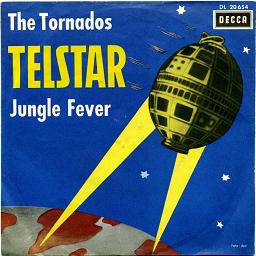
Telstar (instrumental)
"Telstar" is a 1962 instrumental by the English band the Tornados, written and produced by Joe Meek. It reached number one on the UK Singles Chart and the US Billboard Hot 100 in December 1962 (the second British recording to reach number one on that chart in the year, after "Stranger on the Shore" in May). It was the second instrumental single to hit number one in 1962 on both the US and UK weekly charts.[note 1]
Later in 1962, Meek produced a vocal version, "Magic Star", sung by Kenny Hollywood. It was released as a single by Decca Records (cat. nr F11546), with "The Wonderful Story of Love" on the B-side, written by Geoff Goddard. The musical director for both songs was Ivor Raymonde.[5]
Background[edit]
"Telstar" was named after the Telstar communications satellite, which was launched into orbit on 10 July 1962. Written and produced by Joe Meek,[4] it featured either a clavioline or the similar Jennings Univox, both keyboard instruments with distinctive electronic sounds. It was recorded in Meek's studio in a small flat above a shop in Holloway Road, North London. "Telstar" won an Ivor Novello Award and is estimated to have sold at least five million copies worldwide.[6]
In 2007, Tim Wheeler of Ash wrote that "Telstar" was one of the earliest pop tracks influenced by science fiction, and that "for its time it was so futuristic and it still sounds pretty weird today". He observed the influence of "Telstar" in the 2006 single "Knights of Cydonia" by Muse; Muse's singer and guitarist, Matt Bellamy, is the son of the Tornados guitarist George Bellamy.[7]
Lawsuits[edit]
French composer Jean Ledrut accused Joe Meek of plagiarism, claiming that the tune of "Telstar" had been copied from "La Marche d'Austerlitz", a piece from a score that Ledrut had written for the film Austerlitz (1960). This led to a lawsuit that prevented Meek from receiving royalties from the record during his lifetime, and the issue was not resolved in Meek's favour until three weeks after his suicide in 1967. Austerlitz was not released in the UK until 1965, and Meek was unaware of the film when the lawsuit was filed in March 1963.[8][9]
Commercial performance[edit]
The record was an immediate hit after its release, remaining in the UK Singles Chart for 25 weeks, five of them at number 1,[10] and in the American charts for 16 weeks. "Telstar" was the first U.S. number one by a British group. Up to that point, and since World War II, there had only been three British names that topped the U.S. chart: the first was "Auf Wiederseh'n Sweetheart" by Vera Lynn (1952); the second was "He's Got the Whole World in His Hands" by Laurie London (1958); and the third was in May 1962 with "Stranger on the Shore" by clarinetist Acker Bilk.